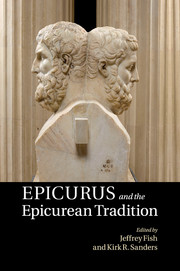Book contents
- Frontmatter
- Contents
- Acknowledgements
- Note on Abbreviations
- List of Contributors
- 1 Introduction
- 2 Autodidact and student: on the relationship of authority and autonomy in Epicurus and the Epicurean tradition
- 3 Epicurus' theological innatism
- 4 Epicurus on the gods
- 5 Not all politicians are Sisyphus: what Roman Epicureans were taught about politics
- 6 Epicurean virtues, Epicurean friendship: Cicero vs the Herculaneum papyri
- 7 Cicero's use and abuse of Epicurean theology
- 8 The necessity of anger in Philodemus' On Anger
- 9 Philodemus, Seneca and Plutarch on anger
- 10 Philodemus and the fear of premature death
- Bibliography
- General index
- Index of passages
3 - Epicurus' theological innatism
Published online by Cambridge University Press: 01 June 2011
- Frontmatter
- Contents
- Acknowledgements
- Note on Abbreviations
- List of Contributors
- 1 Introduction
- 2 Autodidact and student: on the relationship of authority and autonomy in Epicurus and the Epicurean tradition
- 3 Epicurus' theological innatism
- 4 Epicurus on the gods
- 5 Not all politicians are Sisyphus: what Roman Epicureans were taught about politics
- 6 Epicurean virtues, Epicurean friendship: Cicero vs the Herculaneum papyri
- 7 Cicero's use and abuse of Epicurean theology
- 8 The necessity of anger in Philodemus' On Anger
- 9 Philodemus, Seneca and Plutarch on anger
- 10 Philodemus and the fear of premature death
- Bibliography
- General index
- Index of passages
Summary
Epicurean theology has come to be viewed as a battleground between two parties of interpreters, the realists and the idealists. Realists take Epicurus to have regarded the gods as biologically immortal beings living outside our world, to whom we have cognitive access in thought thanks to simulacra – wafer-thin films of atoms – that travel from them and enter our minds. Idealists take Epicurus' idea to have been, rather, that gods are our own graphic idealization of the life to which we aspire, and that the simulacra identified with them are simply those on which, by the standard Epicurean process of visualization (more on this below), we choose to focus our minds in order to enjoy the image of such perfection.
Plato had assigned god a double role: world governor and object of human emulation. Epicurus argued vehemently against the first role, but endorsed the second. Naturally enough, to fulfil a governing role god would need to be an objectively real being. But once that role was eliminated and god's relevance to us was reduced to that of an ideal model, the need for him to exist objectively was likely to seem less pressing. Idealism takes Epicurus to have recognized this fact and reduced the gods to projections of human thought, representing our natural goal: models of a tranquil life free from the fear of death.
- Type
- Chapter
- Information
- Epicurus and the Epicurean Tradition , pp. 29 - 52Publisher: Cambridge University PressPrint publication year: 2011
- 44
- Cited by



